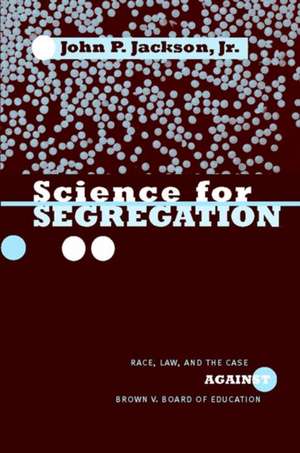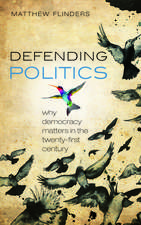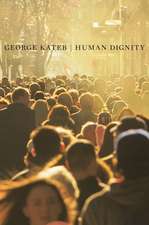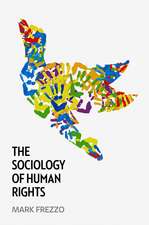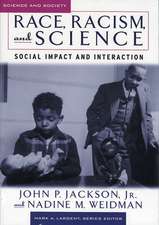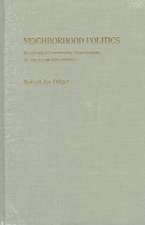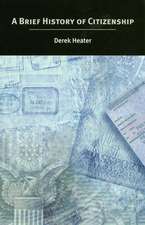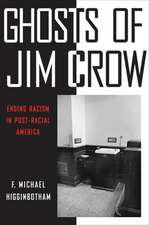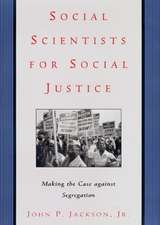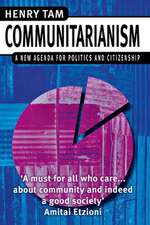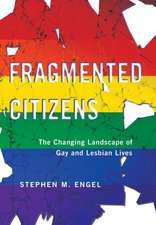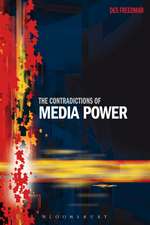Science for Segregation – Race, Law, and the Case against Brown v. Board of Education: Critical America
Autor John P. Jackson Jr.en Limba Engleză Hardback – 31 iul 2005
Din seria Critical America
-
 Preț: 123.12 lei
Preț: 123.12 lei -
 Preț: 256.86 lei
Preț: 256.86 lei -
 Preț: 216.04 lei
Preț: 216.04 lei -
 Preț: 201.62 lei
Preț: 201.62 lei -
 Preț: 223.58 lei
Preț: 223.58 lei -
 Preț: 250.89 lei
Preț: 250.89 lei - 23%
 Preț: 525.71 lei
Preț: 525.71 lei -
 Preț: 247.40 lei
Preț: 247.40 lei -
 Preț: 250.89 lei
Preț: 250.89 lei -
 Preț: 239.73 lei
Preț: 239.73 lei -
 Preț: 262.04 lei
Preț: 262.04 lei -
 Preț: 242.01 lei
Preț: 242.01 lei -
 Preț: 242.22 lei
Preț: 242.22 lei -
 Preț: 248.17 lei
Preț: 248.17 lei -
 Preț: 251.27 lei
Preț: 251.27 lei -
 Preț: 241.08 lei
Preț: 241.08 lei -
 Preț: 205.32 lei
Preț: 205.32 lei -
 Preț: 248.59 lei
Preț: 248.59 lei -
 Preț: 247.40 lei
Preț: 247.40 lei -
 Preț: 245.67 lei
Preț: 245.67 lei -
 Preț: 225.71 lei
Preț: 225.71 lei -
 Preț: 224.33 lei
Preț: 224.33 lei -
 Preț: 246.86 lei
Preț: 246.86 lei -
 Preț: 502.77 lei
Preț: 502.77 lei -
 Preț: 242.78 lei
Preț: 242.78 lei -
 Preț: 227.62 lei
Preț: 227.62 lei -
 Preț: 241.85 lei
Preț: 241.85 lei -
 Preț: 227.44 lei
Preț: 227.44 lei -
 Preț: 222.60 lei
Preț: 222.60 lei -
 Preț: 250.67 lei
Preț: 250.67 lei -
 Preț: 236.06 lei
Preț: 236.06 lei -
 Preț: 242.60 lei
Preț: 242.60 lei -
 Preț: 238.96 lei
Preț: 238.96 lei -
 Preț: 226.09 lei
Preț: 226.09 lei -
 Preț: 241.64 lei
Preț: 241.64 lei -
 Preț: 266.07 lei
Preț: 266.07 lei -
 Preț: 206.85 lei
Preț: 206.85 lei -
 Preț: 224.33 lei
Preț: 224.33 lei -
 Preț: 237.22 lei
Preț: 237.22 lei -
 Preț: 210.16 lei
Preț: 210.16 lei -
 Preț: 242.22 lei
Preț: 242.22 lei -
 Preț: 294.42 lei
Preț: 294.42 lei -
 Preț: 209.17 lei
Preț: 209.17 lei - 23%
 Preț: 533.56 lei
Preț: 533.56 lei
Preț: 584.77 lei
Preț vechi: 759.43 lei
-23% Nou
Puncte Express: 877
Preț estimativ în valută:
111.91€ • 115.85$ • 94.59£
111.91€ • 115.85$ • 94.59£
Carte tipărită la comandă
Livrare economică 05-19 martie
Preluare comenzi: 021 569.72.76
Specificații
ISBN-13: 9780814742716
ISBN-10: 0814742718
Pagini: 292
Dimensiuni: 152 x 229 x 15 mm
Greutate: 0.56 kg
Editura: MI – New York University
Seria Critical America
ISBN-10: 0814742718
Pagini: 292
Dimensiuni: 152 x 229 x 15 mm
Greutate: 0.56 kg
Editura: MI – New York University
Seria Critical America
Recenzii
"Jackson is at his best when exposing the connections of leading racialists with former Nazi party members and Holocaust-denial groups.
Journal of American Ethnic History"A well-researched and well-argued book....Jackson underscored the nexus of science and race, probes the demarcation between science and politics, and questions the very meaning of objective scientific inquiry.
Historian"Science for Segregation adds considerably to our understanding of racist ideologies and their persistance in the post-war era. The author has done an admirable job of covering a forgotten chapter in the struggle over segregation and shedding light on how scientific research can become highly politicized.
Journal of American History"This book asks if science can be divorced from politics. . . . Recommended."
ChoiceA fascinating and comprehensive look at a largely neglected aspect of American historythe role of science and scientists in supporting and sustaining white racist thought and institutions during the battle over de-segregation. And like most good social history, it does not require much strain to draw the relevance to today's debates about the salience of biological taxonomies of race.
Troy Duster, author of Backdoor to EugenicsA very important book that explores the fuzzy zone between science and pseudo-science, exposing the political action of right-wing scientists in the 1950s and 1960s who argued for school segregation on ostensibly scientific grounds. The role of science as an authority in society has never been more evident than in the work and rhetoric of these zealously racist scholars. This well-researched book is a must-read for anyone interested in modern debates over the study of human diversity or the role of science in contemporary society.
Jonathan Marks, author of What It Means to Be 98% Chimpanzee: Apes, People, and Their GenesA deeply-researched, fascinating, and judicious assessment of the scientific arguments that were marshaled against the Supreme Courts landmark school desegregation decision. Jackson has made a contribution that will endure.
Raymond Wolters,author of Du Bois and His Rivals "Jacksons thorough research and a nuanced understanding of the complexities of race and law provide a disturbing cadence to the ongoing debate on race in America.
Multicultural Review
Journal of American Ethnic History"A well-researched and well-argued book....Jackson underscored the nexus of science and race, probes the demarcation between science and politics, and questions the very meaning of objective scientific inquiry.
Historian"Science for Segregation adds considerably to our understanding of racist ideologies and their persistance in the post-war era. The author has done an admirable job of covering a forgotten chapter in the struggle over segregation and shedding light on how scientific research can become highly politicized.
Journal of American History"This book asks if science can be divorced from politics. . . . Recommended."
ChoiceA fascinating and comprehensive look at a largely neglected aspect of American historythe role of science and scientists in supporting and sustaining white racist thought and institutions during the battle over de-segregation. And like most good social history, it does not require much strain to draw the relevance to today's debates about the salience of biological taxonomies of race.
Troy Duster, author of Backdoor to EugenicsA very important book that explores the fuzzy zone between science and pseudo-science, exposing the political action of right-wing scientists in the 1950s and 1960s who argued for school segregation on ostensibly scientific grounds. The role of science as an authority in society has never been more evident than in the work and rhetoric of these zealously racist scholars. This well-researched book is a must-read for anyone interested in modern debates over the study of human diversity or the role of science in contemporary society.
Jonathan Marks, author of What It Means to Be 98% Chimpanzee: Apes, People, and Their GenesA deeply-researched, fascinating, and judicious assessment of the scientific arguments that were marshaled against the Supreme Courts landmark school desegregation decision. Jackson has made a contribution that will endure.
Raymond Wolters,author of Du Bois and His Rivals "Jacksons thorough research and a nuanced understanding of the complexities of race and law provide a disturbing cadence to the ongoing debate on race in America.
Multicultural Review
